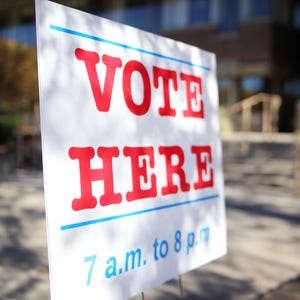“BanglaTown is a cool concept,” Gov. Rick Snyder said to Bangladeshi-Americans in Hamtramck
Greektown and Mexicantown have been well known to metro Detroiters for decades.
Now, the Bangladeshi-American community is working to promote BanglaTown — an area in Hamtramck and Detroit where their population is growing.
On Friday, Michigan Gov. Rick Snyder came to Hamtramck to endorse the idea, cutting a ribbon to formally announce the opening of BanglaTown and the new office of the Bangladeshi American Public Affairs Committee. At a time when his own party is moving toward more of a hardline stance on immigration, the Republican governor told a crowded room of Bangladeshi-Americans he welcomed them.
“Diversity is a positive power,” Snyder said inside the new office of the Bangladeshi group. “We can learn from one another, we can grow together. …This is a fabulous illustration of that positive power, in BanglaTown today.”
Snyder’s visit is part of a push by the State of Michigan and the City of Detroit to make the region immigrant-friendly and revitalize cities that have seen population losses. Officials say that if successful, it could be used as template for other emerging immigrant communities in Detroit.
The word “Bangla” can refer to the Bengali language, spoken by people in Bangladesh and India, or the region where they live. Hamtramck is now at least 15% Bangladeshi, according to U.S. Census figures. About 13.4% of the city are immigrants from Bangladesh, with others born in the U.S. to immigrant parents. Over the past 20 years, many Bangladeshis moved from New York and New Jersey to metro Detroit for more affordable housing.
Many Bangladeshis also live in Detroit near the border with Hamtramck, where there are dozens of Bangladeshi groceries, restaurants, clothing stores and other businesses. There are about 4,100 Detroiters classified by the U.S. Census as “Other Asian,” many of which are believed to be Bangladeshi.
Snyder visited Hamtramck three days after an election that drew national attention because it will result in Hamtramck having a Muslim-majority on its six-member council. It’s believed to be the first city in the U.S. with a majority of Muslims on its council. Three on the City Council now are Bangladeshi American and will be joined by Saad Almasmari, a Yemeni American who was the top vote-getter.
The race saw some tensions over religion, with some anti-Muslim fliers and one candidate who criticized the volume of the Muslim call to prayer broadcast publicly from Hamtramck mosques five times a day. Hamtramck City Councilman Abu Musa, an immigrant from Bangladesh who won re-election on Tuesday and attended Friday’s event, said while he tries to be a faithful Muslim, he will work to represent all in Hamtramck regardless of background.
“I’m a very good Muslim,” Musa told the Free Press. “I try my best to pray five times (a day), but when I get elected, every single ethnic votes for me, not (only) the Muslim vote for me, but Christians, every single ethnic group, African-Americans, Polish. I’m a good friend of the Polish.”
“I represent every single citizen in Hamtramck,” said Musa, who came in second place. “I’m serving all…of Hamtramck.”
Some conservatives have expressed alarm about the election results, saying it could lead to sharia, but Snyder on Friday was full of praise for Hamtramck’s diversity.
“I believe I’m the most pro-immigration governor in the country,” Snyder said. “The world’s only going to become more globalized. … BanglaTown is a cool concept” and reality.
“Michigan is … welcoming everyone to our state.”
Asked about the concern expressed by some conservatives of Hamtramck having a Muslim-majority council, Snyder said:
“It’s the democratic process. People elect good people…I wouldn’t view any of it as a negative. I view it as a positive that the people of Hamtramck think they have a great city council, and we should be proud of that.”
Steve Tobocman, executive director of Global Detroit, attended Friday’s opening, saying that “BanglaTown is a largely untold story of how immigrants can work with local residents to revitalize urban neighborhoods in Detroit and Hamtramck.”
Global Detroit has been working to promote BanglaTown, an idea that has been developed for years by community leaders. And the City of Detroit’s newly created Department of Immigrant Affairs hopes to be involved as well in marketing it.
“We have made Michigan our home,” said Ehsan Taqbeem of Oakland Township, founding chair of the Bangladeshi American Public Affairs Committee. “We have proven we can revitalize this area.”
Religious leaders at the event said that Bangladeshi Americans have helped stabilize Hamtramck and parts of Detroit, refurbishing abandoned homes and reducing crime. There are Bangladeshi mosques, two Bangladeshi Hindu temples, and a Bangladeshi Buddhist center in Hamtramck or in Detroit near the border.
“The Bangladeshi community is very peaceful,” said Bangladeshi Buddhist leader Mahaprabu Dharmananda Mahathero of Detroit, whose Buddhist center in Detroit is close to Hamtramck.
Contact Niraj Warikoo: nwarikoo@freepress.com or ![]() 313-223-4792. Follow him on Twitter @nwarikoo
313-223-4792. Follow him on Twitter @nwarikoo










